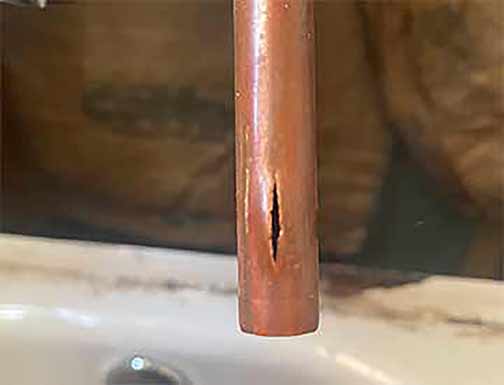
A burst pipe in your Chicago home can cause significant damage if not addressed promptly. The combination of cold winters and aging infrastructure makes Chicago particularly susceptible to this issue. It is crucial to understand the severity of burst pipes and take immediate action to mitigate any potential damage to your property.
Immediate Actions to Take When a Pipe Bursts
The moment you realize a pipe has burst, it’s essential to act swiftly. Your immediate actions can significantly reduce the extent of the damage. Follow these steps to ensure the situation is under control:
- Turn off the main water supply to prevent more water from flooding your home.
- Switch off the electricity in the affected areas to avoid electrical hazards.
- Try to contain the water using buckets, towels, or any other absorbent materials.
- Move valuables and furniture away from the affected area to prevent further damage.
- Make sure everyone in the household is aware of the situation and stays out of the affected zone.
How to Safely Shut Off the Water Supply
Shutting off the water supply quickly is critical to controlling a burst pipe emergency situation. Locate the main water valve, which is usually found in the basement, crawl space, or near the water meter. Turn the valve clockwise to shut off the water. If the valve is stuck, use a wrench to aid in turning it. Familiarize yourself with this procedure ahead of time to ensure you can act promptly during an emergency.
Steps to Drain Water from the System
Once the water supply is shut off, you need to drain the remaining water from the system to prevent further leakage. This involves opening all faucets and flushing toilets until the water stops flowing. By doing this, you reduce the pressure in the pipes and prevent additional leaks from forming.
How to Identify the Source of the Burst
Identifying the exact source of the burst pipe is crucial in ensuring the repair is done correctly. Look for visible signs of water damage, such as wet spots, drips, or pooling water. Trace the water back to its origin. In some cases, the burst may be behind a wall or ceiling, requiring more extensive investigation. If you are unable to identify the source, it is advisable to contact a water leak detection plumber for assistance.
Prevent the Spread of Water Damage
After containing the immediate threat, your focus should shift to preventing further water damage. Use towels, mops, and wet vacuums to remove standing water. Dehumidifiers and fans can help to dry out the affected area. Prevent mold and mildew by thoroughly drying any wet surfaces and materials. It is essential to act quickly, as mold can start to form within 24 to 48 hours of water exposure.
Contacting an Emergency Plumber in Chicago
While taking immediate action to address the burst pipe is crucial, contacting an emergency plumber is equally important. Experienced plumbers have the expertise and equipment to handle burst pipes and mitigate damage effectively. Give priority to local Chicago-based plumbers, as they will be familiar with the common issues that affect homes in the area. Make sure to provide a detailed description of the problem to the plumber and inquire about their emergency response times.

Experienced plumbers have the expertise and equipment to handle burst pipes and mitigate damage effectively.
Assessing and Documenting the Damage for Insurance
After stabilizing the situation, it is important to document the damage for insurance purposes. Take detailed notes and photographs of all affected areas. Contact your insurance company as soon as possible to report the incident. They may require you to provide an itemized list of damaged belongings and receipts for any repair costs. Keep all documents well-organized to facilitate a smooth claims process.
Preventative Measures to Avoid Future Bursts
Preventing future pipe bursts involves taking proactive steps to protect your plumbing system. Consider the following measures:
- Insulate pipes, especially those in unheated areas like basements, attics, and garages.
- Keep the thermostat at a consistent temperature, even when you are away from home.
- Seal any drafts around doors and windows to prevent cold air from affecting your pipes.
- Schedule regular maintenance checks with a professional plumber to identify potential issues early.
- Install pipe sleeves or heat tape for added protection in extremely cold weather.
Implementing these measures can significantly reduce the risk of future pipe bursts and help protect your home from water damage.
Conclusion: Stay Prepared and Stay Calm
Dealing with a burst pipe in your Chicago home can be a stressful experience, but staying calm and taking immediate action can help minimize the damage. Remember to shut off the water supply, drain the system, identify the source of the burst, and contact an emergency plumber. Documenting the damage for insurance and taking preventive measures can help you recover more efficiently and prevent future occurrences. Stay prepared, stay calm, and protect your home from the adverse effects of burst pipes.
—